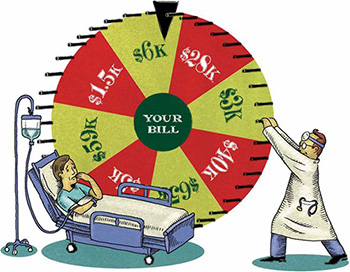Do you agree that hospitals keeping pricing agreements with payers secret is really protected speech?
On Wednesday, the American Hospital Association sued the Trump administration over a proposed rule compelling hospitals to publish secret negotiated rates with insurers would violate the First Amendment. They also argued such regulation is otherwise not rooted in law. [Wall St. Journal]
Without commenting on the merits of price disclosure or administrative rule making, it feels like the First Amendment claim is a potentially costly overreach. The First Amendment’s speech provisions explicitly prevent the government from limiting most kinds of speech, and courts have ruled, neither can the government compel speech. But is requiring hospitals to report their agreements with payers actually speech?
Price disclosure is something the government routinely forces
From the government’s perspective, requiring the disclosure of a lowest rates is a common requirement in bidding on federal or state work. If the speech claim were to hold, its likely another reporting approach would be found to sidestep this objection. This advances a clear policy agenda, which is to address an informational asymmetry that exists between hospitals who have expert knowledge of treatment and costs compared to consumers who have limited information as they agree to care.
From a hospital’s perspective, this is an administrative requirement with a modest $300/day fine for non-compliance. This pales compared to the hard dollar investment required by regulators to manage capacity or provide free care. What the AHA actually seeks to avoid is the public relations impact of not following this requirement. One might argue the force of this law is public sentiment and not regulation per se.
The free speech argument worked for drug companies regarding advertising
Drug makers successfully used speech protection in their lawsuit this July, which blocked a similar rule requiring them to disclose pricing on all television ads for drugs. Obviously the speech component of this case which addressed the content of advertising was far greater than merely posting rates. [Wall St. Journal|.
This adds to healthcare’s ‘trust problem’

Over the last two decades the Internet has lessened informational asymmetries that previously forced customers to overpay. Consumers today get better deals when buying cars, booking travel, or buying a range of goods because they can now easily price compare. But hospitals routinely ask patients to enter their care unable to accurately project the final cost of even routine procedures. Healthcare as a ‘trust problem’, and it starts with opaque pricing, and what can seem like a disregard of those caring for patients physical health to consider their financial health as well.
Speech rights are fundamental, and I don’t seek to minimize them here. But there is no inherent right to be paid for health services by the federal government. There is little doubt that a legal basis will be found to advance transparency requirement in a way consistent with speech rights.
Hospitals can influence how this eventually takes place – but arguing a constitutionally inherent right to secret pricing risks alienating the public, and unnecessarily increasing the level of mistrust between patients and providers. In short, the AHA lawsuit is preserving a serious problem rather than fixing it. The speech claim is dubious, and in the long-term blocking price disclosure won’t help restrain costs or empower patients.

 The future of digital experiences will be built by strategists who grasp the full array of emerging business, social, and technical models. Specialties in user experience, branding, application design, and data science are laying the foundation for richer user experiences and business models breakthrough products and revenue based marketing.
The future of digital experiences will be built by strategists who grasp the full array of emerging business, social, and technical models. Specialties in user experience, branding, application design, and data science are laying the foundation for richer user experiences and business models breakthrough products and revenue based marketing.
12 Responses to "Do you agree that hospitals keeping pricing agreements with payers secret is really protected speech?"
December 9, 2019
Pretty cool post. Lots of good information.
https://carpetcleaningwindsor.ca
June 28, 2020
Though not all doctors are like that, we still can’t deny it. Heard various news about this.
March 11, 2021
w4m cairns is the best web place for lonley guys to find fine ladies for chat in Australia
April 8, 2021
Spend your free time chatting with hot girls from our web platform sluts in bristol
June 25, 2021
Find fine ladies for sexy chat contacts in UK and enjoy on our web platform Sexadvertenties Noord-Holland
May 31, 2022
Wow, I love it! Thank you so much for sharing
June 14, 2022
Find fine hot ladies for sex contacts in EU at sex in luzern
June 17, 2022
Wow, I love it! Thank you so much for sharing
November 7, 2022
Wow, I love it! Thank you so much for sharing
February 22, 2023
If you have some extratime visit our web platform and find ladies for casual contacts Chur Sex
March 20, 2023
Wow, I love it! Thank you so much for sharing
June 26, 2023
I’m blown away by how much I like it. I appreciate you letting me in on this dordle.